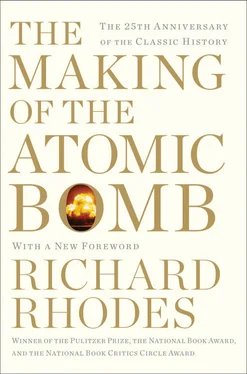Robert Rhodes
THE MAKING OF THE ATOMIC BOMB
The 25th Anniversary Edition
In memory
John Cushman
1926-1984
The author acknowledges with gratitude the support of the Ford Foundation and the Alfred P. Sloan Foundation in the research and writing of this book.
Taken as a story of human achievement, and human blindness, the discoveries in the sciences are among the great epics.
Robert Oppenheimer
In an enterprise such as the building of the atomic bomb the difference between ideas, hopes, suggestions and theoretical calculations, and solid numbers based on measurement, is paramount. All the committees, the politicking and the plans would have come to naught if a few unpredictable nuclear cross sections had been different from what they are by a factor of two.
Emilio Segrè
PRAISE FOR
THE MAKING OF THE ATOMIC BOMB
“A great book. Mr. Rhodes has done a beautiful job, and I don’t see how anyone can ever top it.”
—LUIS W. ALVAREZ, Nobel Laureate for Physics, 1968
“…what I read already impressed me with the author’s knowledge of much of the history of the science which led to the development of nuclear energy and nuclear bombs and of the personalities which contributed in the U.S. to the development of these. I was particularly impressed by his realization of the importance of Leo Szilard’s contributions which are almost always underestimated but which he fully realizes and perhaps even overestimates. I hope the book will find a wide readership.”
—EUGENE P. WINGER, Nobel Laureate for Physics, 1963
“I found The Making of the Atomic Bomb well written, interesting and one of the best in the great family of books on the subject. It is fascinating as a novel, and I have learned from it many things I did not know. Mr. Rhodes has done his homework conscientiously and intelligently.”
—EMILIO SEGRÈ, Nobel Laureate for Physics, 1959
“Mr. Rhodes gives careful attention to the role which chemists played in developing the bomb. The Making of the Atomic Bomb strikes me as the most complete account of the Manhattan Project to date.
—GLENN T. SEABORG, Nobel Laureate for Chemistry, 1951
“The Making of the Atomic Bomb is an epic worthy of Milton. Nowhere else have I seen the whole story put down with such elegance and gusto and in such revealing detail and simple language which carries the reader through wonderful and profound scientific discoveries and their application.
The great figures of the age, scientific, military, and political, come to life when confronted with the fateful and awesome decisions which faced them in this agonizing century. This great book dealing with the most profound problems of the 20th century can help us to apprehend the opportunities and pitfalls that face the world in the 21st.”
—I. I. RABI, Nobel Laureate for Physics, 1944
Foreword to the 25th Anniversary Edition
More than seven decades after its conception under the looming storm front of the Second World War, the Manhattan Project is fading into myth. The massive production reactors and plutonium extraction canyons at Hanford, Washington; the half-mile-long uranium enrichment factory at Oak Ridge, Tennessee; the several hundred thousand workers who built and operated the vast machinery while managing to keep its purpose secret, disappear from view, leaving behind a bare nucleus of legend: a secret laboratory on a New Mexican mesa, Los Alamos, where the actual bombs were designed and built; a charismatic lab director, the American physicist Robert Oppenheimer, who rose to international prominence postwar until his enemies brought him low; a lone B-29 bomber incongruently named for the pilot’s mother, Enola Gay; a devastated city, Hiroshima, and poor ruined Nagasaki all but forgotten.
Almost mythical too are the weapons themselves, except when an enemy seeks to acquire them. New nuclear powers are a threat, we are warned; old nuclear powers keep the peace. A young scholar, Anne Harrington de Santana, has discerned that nuclear weapons have acquired the status of fetish objects; like the coin of the realm in relation to commodities, our glittering warheads have become markers of national power: “Just as access to wealth in the form of money determines an individual’s opportunities and place in a social hierarchy, access to power in the form of nuclear weapons determines a state’s opportunities and place in the international order.” That’s why most industrial nations have considered acquiring nuclear weapons at one time or another since 1945 even as none has dared to use them. If the bombs were ever actually used, the walls would come tumbling down.
The danger of use was one reason I decided in 1978 to write the history of the development of the first atomic bombs. (Another reason was the declassification of the bulk of Manhattan Project records, which made it possible to support the story with documents.) Nuclear war seemed more imminent then than it does now. In the late 1970s and early 1980s, when I researched and wrote this book, the nuclear arms race between the United States and the Soviet Union appeared to be accelerating. I, and many others, worried that accident, inadvertence, or misunderstanding would lead to catastrophe.
The Soviets were at war in Afghanistan and appeared to President Jimmy Carter to be thrusting down toward the Arabian Sea and the oilrich Middle East—something Carter swore the United States would not allow even if it meant nuclear war. The Soviets were determined to enlarge their nuclear arsenal to match ours—a decision they made in the aftermath of the Cuban Missile Crisis of 1962, when President John F. Kennedy was able to back them down by threatening nuclear war—and the closer they came to parity the more belligerently the American right howled for blood. Ronald Reagan, elected president in 1980, proceeded to more than double the U.S. defense budget while coining such provocative characterizations of the other nuclear superpower as “the evil empire” and “the focus of evil in the modern world.” The Soviets shot down a Korean airliner that had wandered into their airspace, killing all aboard. A 1983 NATO field exercise, Able Archer, which included a trial run-up to nuclear war in which heads of government participated, very nearly scared the Soviet leadership under an ailing Yuri Andropov into launching a nuclear first strike.
Disturbing as these events were, I found it hard to believe that a species as clever and adaptable as ours would voluntarily destroy itself, even though it had voluntarily manufactured the means to do so. I wondered if, back at the beginning, before the first bombs burned out those two Japanese cities and fundamentally changed the nature of war, there had been alternative pathways to the present, pathways different from those which we and the Soviets had followed. Why seventy thousand nuclear weapons between us when only a few were more than enough to destroy each other? Why a primarily military confrontation across the Cold War when nuclear weapons made direct military conflict between the superpowers suicidal? Why, on the other hand, despite all the rhetoric and posturing, had not one nuclear weapon been exploded in anger since Nagasaki? It seemed to me that if I went back to the beginning, even to before the beginning, when releasing the enormous energies held latent in the nuclei of atoms was simply an interesting and challenging physics problem, that I might rediscover abandoned pathways which could, if reilluminated, lead toward an outcome different from the looming threat of nuclear apocalypse.
Читать дальше












